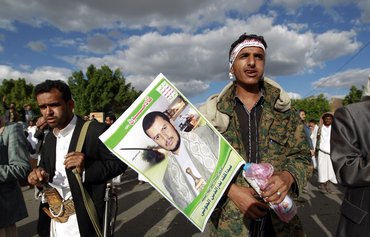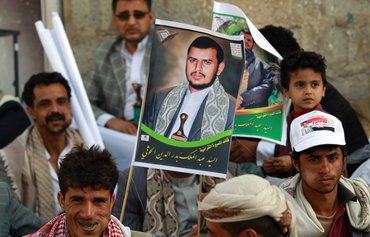Marib Military Court on Monday (November 2nd) held its fifth hearing in the trial of Houthi chief Abdul Malik al-Houthi and 174 other Houthi leaders on charges that include staging a coup against the Yemeni government.
During the fifth hearing of the trial, which opened July 7th, the court reviewed its prior decisions, including a request to the prosecution to notify the witnesses to present their evidence.
The court, with military court chief Aqeel Taj al-Din presiding, also acknowledged the presence of defence attorneys and the lawyers for victims' families and representatives of the Ministry of Defence.
The prosecution presented evidence of the Houthis' communication with Iran, which included details of Iran's dispatch of Islamic Revolutionary Guard Corps (IRGC) officer Hassan Eyrlou to serve as Iran's ambassador in Sanaa.
The prosecution said it would take the necessary steps to ensure Eyrlou is included on the list of defendants in the next hearing.
The court also heard the testimony of witnesses for the prosecution, including Yemeni army spokesman Brig. Gen. Abdo Majali, who testified to a number of crimes and violations committed by the Houthis (Ansarallah).
Majali also cited a number of incidents which reveal the Houthis' involvement in communicating with Iran, staging a coup, occupying state institutions, carrying out looting, and using excessive force against the Yemeni people.
The court then heard the testimonies of a number of victims of Houthi crimes.
Testimonies focused on how the Houthis had attacked the armed forces and the presidential residence at al-Maashiq Palace in Aden, seized weapons and state-owned properties, planted landmines and killed and displaced civilians.
At the end of the hearing, the court allowed the plaintiffs to file their cases and present their evidence in anticipation of the next hearing.
Commenting on the trial, rights activist and lawyer Abdul Rahman Berman told Al-Mashareq the procedures were a positive step in the judicial process that are certain to secure convictions.
"When judgements convicting them of crimes are passed, all countries will be bound, if requested by Yemen, to arrest them" if they seek shelter abroad, and to extradite them to Yemen, he said.
"The human rights violations and crimes that Houthis have committed with Iranian support over the past five years, in which thousands have been killed and displaced, highlight the importance of the case," he said.

![A Yemeni judge and court officials attend the trial of suspected Houthis standing behind bars at the state-security court in Sanaa on January 17th, 2010. [Ahmad Gharabli/AFP]](/cnmi_am/images/2020/11/03/26835-yemen-houthi-trial-600_384.jpg)






